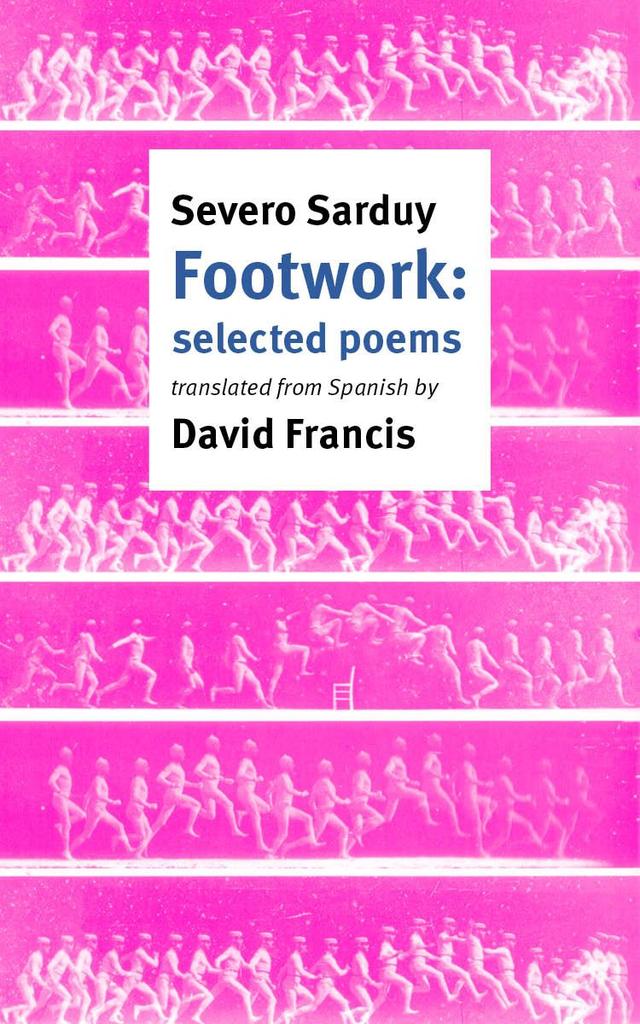Footwork
Footwork by Severo Sarduy
Translated from Spanish by David Francis
First edition. Publication date: February 2021
Novelist, poet, painter, and literary theorist, Severo Sarduy was one of the most groundbreaking Latin American writers of the twentieth century. Born in Camagüey, Cuba in 1937, he moved to Havana in 1956 to study medicine, but soon gave up his scientific pursuits for the arts. From 1960 until the time of his death, the poet lived in Paris where he worked with Roland Barthes, Julia Kristeva, and many others, on the literary magazine Tel Quel. Sarduy died due to complications with AIDS in 1993.
Although Sarduy’s novels have been translated into English and received praise from such writers as Richard Howard and James McCourt, this is the first collection of his poetry to appear in English translation. Footwork represents poems from throughout Sarduy’s life, following the thrilling trajectory of a great thinker.
David Francis translated the poems from Spanish into an acrobatic English. He writes, Footwork is “a body of work that sings on its own, that celebrates the carnal life, the sensual experiences of dance, of painting, food, music, and sexual pleasure, but that also recognizes—in these pleasures—the imminence of one’s passing.”
Sarduy invents new forms to engage questions of identity, specifically how his own and Cuba’s Spanish, African, and Chinese heritage is intrinsically intertwined with Cuba’s history of slavery and indentured labor. As Francis writes, “Severo Sarduy was not known to follow convention. Nor did he think that conventional approaches to storytelling or lyrical composition could capture the complexities of human behavior or personal and national identity.”
The title, Footwork, “recognizes how Sarduy’s poems deliver devastating wit, which lands on its prototypical feet or adroitly maneuvers, purposefully, around naming objects, people, or body parts and toward unexpected endings,” writes Francis.
This poetry makes it clear why Gabriel García Márquez once called Sarduy the best writer in the Spanish language.
Wayne Koestenbaum writes: "Baroque, yes, as we expect from the great Severo Sarduy: but these poems are also severe, mathematical, futurist, neoclassical, occasional, private, courtly, and lubricated. Some of the poems come from the heady world of poststructuralism, but most come from a Caravaggio-like sepulchral grotto, where a lush and explicit eroticism meets up with the sculpted and the shaped. Fixity is everywhere in this volume: fate fixes Sarduy, just as the seam between sex and language fixates his verse. David Francis's translations are a labor of love, executed with ingenuity and a voluptuary fineness.”
Excerpts
Poetry Society of America, March 31, 2021: “To the Letters of the Alphabet” and a discussion by David Francis
Poetry Daily, December 4, 2020: Seguidillas
Praise
Experimental novelist, philosopher of the neo-baroque, and poet of the first order, Severo Sarduy alternately modeled language into concrete configurations of abundance and classical form into scenes of seductions, always with the irrepressible enjoyment of queer desire, luxurious and hyperbolic. Sarduy’s charisma dazzles here in the propulsive curvilinear associations David Francis boldly stages in these inviting English translations.
Roberto Tejada
Baroque, yes, as we expect from the great Severo Sarduy: but these poems are also severe, mathematical, futurist, neoclassical, occasional, private, courtly, and lubricated. Some of the poems come from the heady world of poststructuralism, but most come from a Caravaggio-like sepulchral grotto, where a lush and explicit eroticism meets up with the sculpted and the shaped. Fixity is everywhere in this volume: fate fixes Sarduy, just as the seam between sex and language fixates his verse. David Francis’s translations are a labor of love, executed with ingenuity and a voluptuary fineness.
Wayne Koestenbaum
David Francis has undertaken the task of translating one of the most important Cuban writers of the 20th century. He has approached Sarduy's poems with a clear understanding that language, place, and literature are entangled, and that only an entangled translation can pay homage to their brilliance. Through this formidable edition, I have experienced anew that early queer joy of reading Sarduy. I've remembered why I fell in love with these poems, in falling in love with these translations.
Raquel Salas Rivera
Press
April 1, 2021: Translating Severo Sarduy in Yale Center for the Study of Race, Indigeneity, and Transnational Migration YouTube channel
David Francis in conversation with Shawn McDaniel on translating the book
February 9, 2021: LGBTQIA+ New Books for the Week of Feb 7–13, 2021 in Rainbow Crate Book Box
A brief mention of the book among other newly released LGBTQIA+ books
